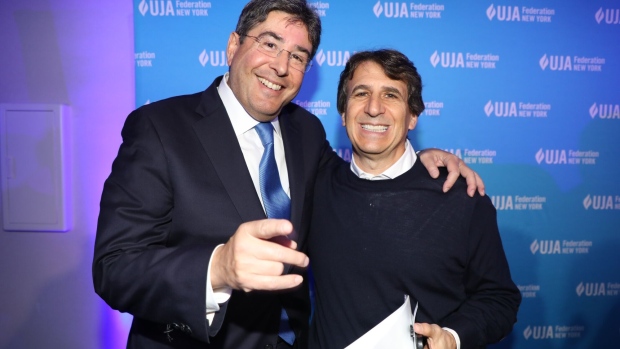Dec 5, 2023
Apollo’s Marc Rowan Urges UJA Donors to Speak Out Against Antisemitism
, Bloomberg News

(Bloomberg) -- It’s usually a happy night for Wall Street machers — a holiday-spirited moment to celebrate and raise money for Jewish organizations in New York and Israel.
But this year’s UJA-Federation of New York Wall Street Dinner, gathering more than 1,600 financial professionals including Dan Loeb, Paul Taubman, Robert Kapito and Lloyd Blankfein, was different. In addition to raising a record amount, it exemplified a community’s resolve in the face of the Israel-Hamas war and accompanying rise of antisemitism.
“We have our own war here in the US,” said Marc Rowan, CEO of Apollo Global and chair of UJA’s board, who won fierce applause as he approached the podium in an apparent nod to his calling out the University of Pennsylvania for its response to Hamas’s Oct. 7 attack.
Now he called on others to “speak out,” too.
Read More: Apollo’s CEO Demands UPenn Leaders Quit Over ‘Antisemitism’
While Jewish communities around the world have been shaken and galvanized, the collective horror has been particularly pronounced in New York, where the metro area has 1.9 million Jews, or roughly 25% of the US total.
Not since the annual event’s founding in 1975 has it unfolded in such an atmosphere of fear, anger and grief. And not since its founding has the event raised $45 million — almost 50% more than the previous record.
“We are all going to have to change,” Rowan said Monday night at the New York Marriott Marquis, adding that it requires “being a little uncomfortable,” holding organizations and academic institutions “we love” to account, and getting their attention “financially or otherwise.”
Rowan also recommended prioritizing support of UJA for its role in the fight. As outlined by Eric Goldstein, UJA’s CEO, this includes providing security for underresourced Jewish institutions to supporting legal counsel for students on college campuses to trips to Israel for officials and interfaith leaders.
The event’s two honorees, meanwhile, invoked the spirit of the waves of Jewish immigrants who have shaped city’s cultural life and, for many, its very sense of itself.
Wesley LePatner, chief operating officer of the Core+ real estate business at Blackstone, introduced herself as a “third-generation Manhattanite,” who kept kosher and observed Shabbat growing up on the East Side.
“So much of my childhood was spent with people who seemed to accept me, seemed to not care what religion I was,” she said. But her parents went out of their way to remind her that, “Yes, I was an American, but I was first and foremost Jewish.”
Her father worried that she hadn’t known the mistreatment of Jews he’d experienced, something she remembered when she stood with 300,000 others at the March for Israel in Washington last month.
Brian Friedman, president of Jefferies, recalled his schooling at a yeshiva and eating treats from his family’s Jewish bakery while growing up in Paterson, New Jersey. It was a community with a dwindling Jewish population and increasing racial strife — his father kept a gun under the car seat, he said.
Walking to school every day, Friedman learned to keep an eye out for himself. So he felt ready for life in Manhattan, where soon enough, as a young lawyer, he found another institution, like his yeshiva, focused on nurturing and raising up the Jewish community: the UJA.
“We must never allow ourselves to be where Jews were in the past,” Friedman said.
--With assistance from Katherine Doherty.
©2023 Bloomberg L.P.

